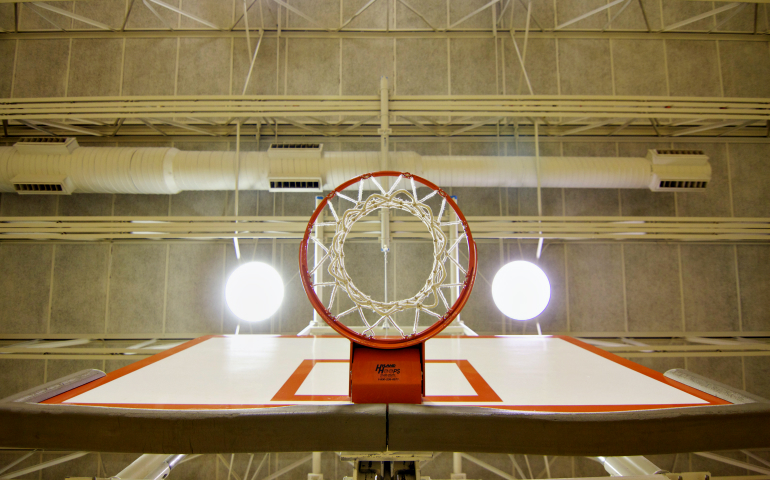
(Pixabay/landersb)
I don't play under-35 pickup basketball every Thursday night to experience human goodness, but it turns out the local high school gym is a great place to find it.
The human goodness appears in lots of little things. Here are seven:
- Picking teams. When the first 10 guys have arrived, teams form for the first game. We used to shoot free throws to see who would be on which team (first five to make it played the other five), but that largely random process often led to noncompetitive matchups. So two players now serve as captains and take turns picking teammates. This would be as painful as junior-high phys ed for some of us, except for this one wrinkle: The captains pick their players quietly, off to the side while everyone else warms up. Then, they announce the teams all at once. Egos are spared.
- Hospitality. One of the guys who comes sometimes is on the autism spectrum. He is an energetic defender but struggles on the offensive end of the court. There was never any announcement about how to play with him, and he doesn't get the ball all that often, but when he catches it with an open look at the basket, his teammates — no matter who they are — usually encourage him to shoot. The game is no different otherwise; he is integrated smoothly.
- Sharing. We have a few ball hogs, but most of us try to pass it around. As the group is largely consistent month to month, we get to learn each other's strengths and weaknesses. The best playmakers are able to get their teammates the ball in situations where they're most likely to succeed. For me, this means floating around the outside, waiting for an open jumper. My favorite teammates are ones who can drive into the lane, collapse the defense, and kick it out to me for the shot. I try to return their generosity by setting a hard screen next time down the floor. Just like the pros, your team is most likely to win a lot if you have a balanced combination of shooters, ball handlers, and rebounders, each understanding and playing within his own respective role.
- Compliments. There are more verbal affirmations per minute here than any other place I go. One guy in particular notices all the good things his teammates do and mentions them while we run down the court. "Great screen." "Great pass." "Great board." "Great move." It's mostly "greats." He is the best player in the group, so his words mean something. I try to follow this example.
- Admitting you're wrong. At most pickup games I've played in, players on offense have to call their own fouls if they get hit by a defender. This tradition usually works pretty well, though it can lead to conflicts if the player with the ball calls a foul when the defender thinks he made a clean play. It's different here — defensive players are expected to call the fouls on themselves, to admit they have done wrong. "Ah, I got him. Stays here," is how this is often expressed.
- Keeping cool. Occasionally, tempers flare and there's some shouting. One time, two guys almost came to blows. I walked quickly away and stared at them, frozen. A big, typically quiet dude stepped right in between the arguing players and pushed them apart. His surprising assertiveness shut things down before they got out of hand. The main instigator seemed to be embarrassed, and he left for the night. Most of us realize the stakes aren't high and act accordingly.
- Camaraderie. A few of us head to a dive bar around the corner at the end of the night to talk about the games and watch more basketball. During the rest of the week, we text, email and tweet each other about the NBA and college seasons.
I think I sent them video of my favorite moment from March Madness so far: In the Big East Tournament semifinals, before the main national tournament began, Seton Hall's Angelo Delgado missed a layup at the buzzer that would've beaten title favorite Villanova. As the teams lined up to shake hands, Delgado remained under the basket, bent over at the waist, elbows on his knees and hands on his head. Two teammates came over to console him, and then a third player: Villanova star Josh Hart, who had made the game-winning shot moments before Delgado's miss.
Hart bent over, whispered something to Delgado, and slapped him encouragingly on the chest. Delgado stood up, and there was the rest of the Villanova team, which had completed the handshake line. One after the next, they hugged Delgado and shared their respect for one of the hardest-working players in the game.
Maybe basketball, wherever it's played, can be a venue for human goodness because success requires sharing, teamwork, persistence and wanting the best for each other, over and over again, until the final buzzer sounds or the high school custodian shuts off the lights.
[Mike Jordan Laskey is the director of Life & Justice Ministries for the diocese of Camden, N.J. He blogs for the Camden diocese at camdenlifejustice.wordpress.com.]
Editor's note: We can send you an email alert every time a Young Voices column is posted to NCRonline.org. Go to this page and follow directions: Email alert sign-up.


